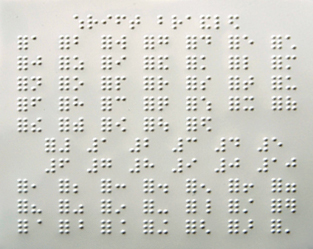12pm-1pm, Friday, March 22, Research Education and Visualization Environment at the Digital Worlds Institute (NRG building).

Human-readable information encoding has transitioned throughout human history utilizing the available technologies. During this evolution, humans familiarized themselves with various encoding schemes beyond natural language alphabets, such as Braille, Tally marks, and much more recently Morse code, Cellphone texting in 4×3 numerical keypads, emoticoding, and many others. This presentation discusses the common elements behind these encoding schemes and showcases how these could be utilized in modern text editors by extending the traditional constraints of writing. A real-world application will be shown that demonstrates how mapping between natural languages and computer languages can be developed in order to help users learn new encoding schemes with minimal learning curve.

Angelos Barmpoutis is an Associate Professor in the On-Line Learning Institute and the Digital Worlds Institute at the University of Florida. He is also the coordinator of research and technology in the Digital Worlds Institute, and affiliate faculty of the Computer and Information Science and Engineering Department and the Biomedical Engineering Department, University of Florida. His areas of expertise include interdisciplinary applications of computer science and engineering to the service of the broad areas of learning and training.
Reading materials:
- Angelos Barmpoutis, Kim Huynh, Peter Ariet, and Nicholas Saunders, “Assessing the effectiveness of emoticon-like scripting in computer programming” Advances in Intelligent Systems and Computing, vol. 598, 2018. Springer, Cham, pp. 63-75. https://doi.org/10.1007/978-3-319-60011-6_7
- Angelos Barmpoutis and Kim Huynh “Name Tags and Pipes: Assessing the Role of Metaphors in Students’ Early Exposure to Computer Programming Using Emoticoding”, Advances in Human Factors in Training, Education, and Learning Sciences, 2019, Springer, pp. 194-202. https://doi.org/10.1007/978-3-319-93882-0_20
- Angelos Barmpoutis “Integrating algebra, geometry, music, 3D art, and technology using emoticoding”. In: Proceedings of the 8th IEEE Integrated STEM Education Conference (ISEC), March 10, 2018, IEEE, pp. 30-33. https://doi.org/10.1109/ISECon.2018.8340500
- Angelos Barmpoutis “Learning Programming Languages as Shortcuts to Natural Language Token Replacements”, Association for Computing Machinery Conference Proceedings Series, 2018, pp. 1-10. ACM ISBN 978-1-4503-6535-2/18/11. https://doi.org/10.1145/3279720.3279721
